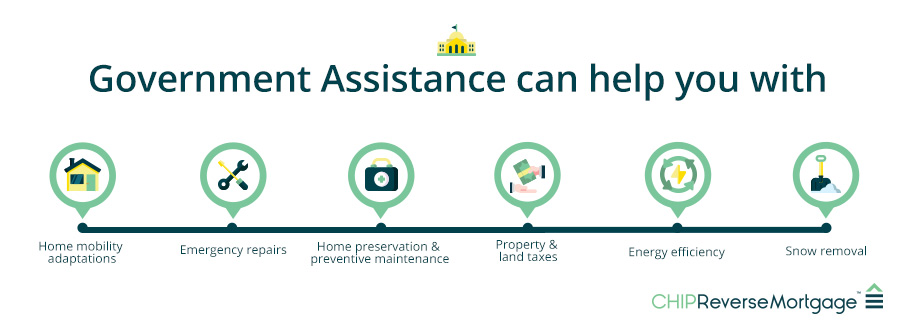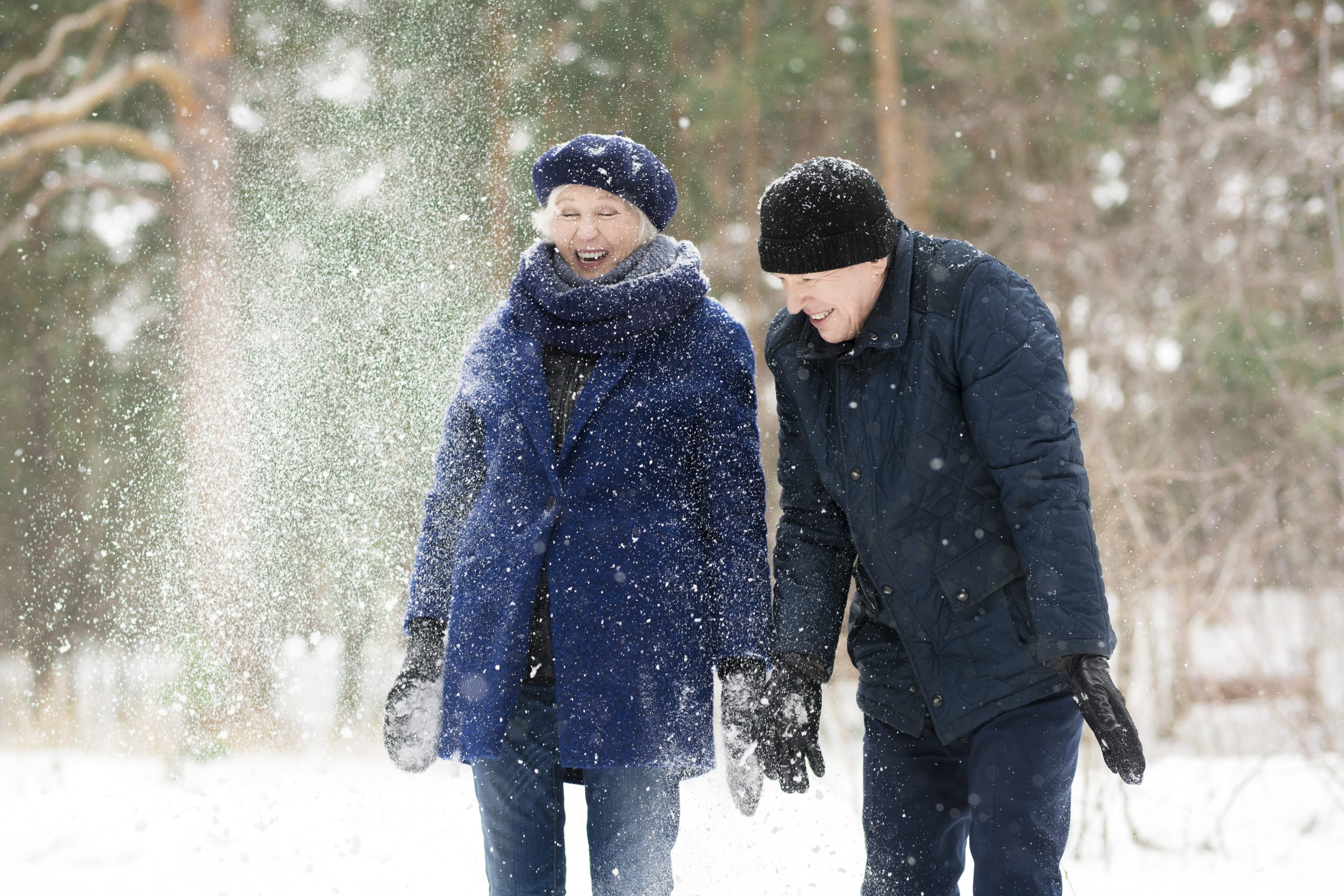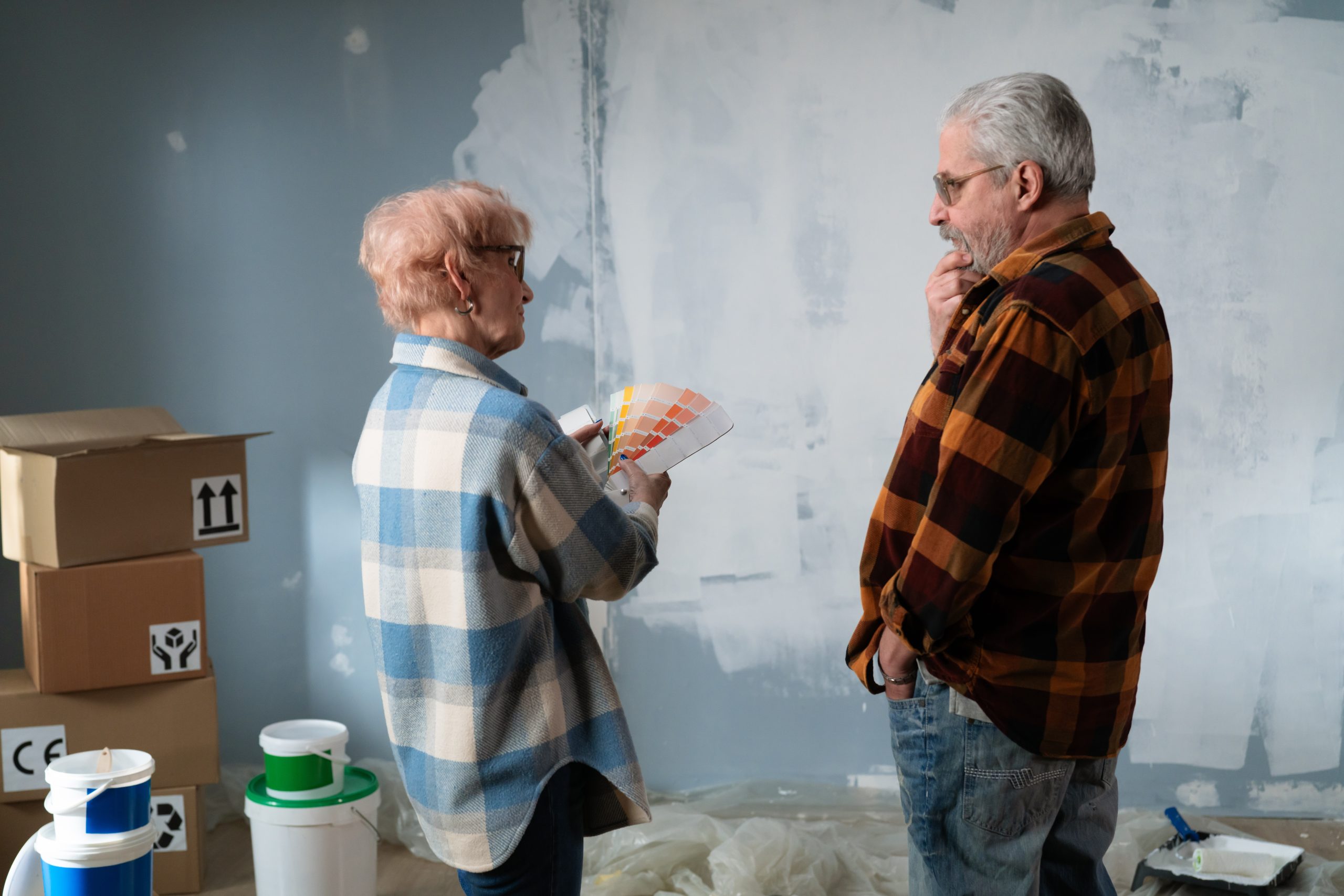Government Grants for Canadian homeowners
Although most Canadians prefer to stay in their own homes post-retirement (93% according to a recent IPSOS study), many feel pressured to consider other options due to lack of sufficient funds or for medical reasons. Whether it is the increased life expectancy, the ever-inflating costs of living, or the lack of proper financial planning, many Canadians find it difficult to lead a comfortable life with their retirement savings alone.
- Two-thirds of the Canadian workforce does not have a workplace pension.
- Private savings options, such as Registered Retirement Savings Plans (RRSPs) do not make up for the shortfall in retirement savings.
However, did you know that the Government of Canada seniors benefits offers over 100 different types of grants, rebates and tax credits across provinces, which are meant to help Canadians retain their homeownership or tenancy? Every Canadian province runs its own incentives and programs to help Canadians:
- Save money
- Be self-reliant
- Enjoy the improved quality of life
From grants for home repairs and renovations to property tax credits, write-offs and special needs assistance, the Government of Canada seniors benefits are addressing various aspects of Canadians 55+ living at home.
Government Grant for seniors to stay home
Retaining independence is important, especially as we age. Many people find it more comfortable to remain in familiar surroundings even though issues such as deteriorating health and low income continue to create difficulties in day-to-day living. Although family, friends, neighbours and local community programs may help you in some way, it is understandable that you want to be as self-reliant as possible. This is where the government grants for seniors in Canada come in. No matter what program you choose, all the federal and provincial benefits enable retired Canadians to enjoy a safe, cost-efficient and well-maintained home.
For example, Service Canada’s Home Adaptations For Independence (HAFI) Program, as well as Residential Rehabilitation Assistance Program (RRAP) are grants for seniors to stay in their homes and offer home repairs-related financial assistance to low-income Canadians. Both programs support the home modifications or repairs for people with diminished physical abilities:
- HAFI: is applicable in British Columbia for minor home adaptations, such as the installation of handrails, bathtub grab bars, chair lifts, etc. enabling independent living.
- RRAP: is applicable to all First Nations or individual First Nation members for major repairs to bring the house up to minimum health and safety standards, including structural repairs, plumbing, heating, electrical, fire safety and more.
While every province offers services, benefits, and grants for seniors to stay in their homes, the specifics or nature of the grants may vary. For example, in the Northwest Territories, the government helps you stay warm by subsidizing a substantial portion of your heating bills through the Home Heating Subsidy. If you’re living in Nova Scotia, you have the Home Warming Low-Income Program, through which you can get a free energy assessment and necessary upgrades at no extra cost to you.
What are the Canadian grants for seniors?
The primary aim of the government grants and assistance programs is to enable Canadians, like you, to live independently, safely and comfortably in your home.
Are you eligible for these Government grants?
- Age: While most provinces define eligibility as someone who is 65 years or older, a few provinces have a lower threshold of 55 years. You must turn that age in the year of taxation, in order to be eligible to apply for any of the programs.
- Income: Your individual or family’s combined annual income may be taken into account to establish your eligibility for the definition of ‘low-income’ in your province.
Do check the specific qualifying criteria for each program on your provincial website. If you are a Veteran or a First Nations’ member, some additional incentives may also be applicable.
Are government benefits not getting you the cash you need? Find how much cash you can get with the CHIP Reverse Mortgage.
Government Grants for Seniors’ Home Repairs and Renovations in Canada

- Home adaptations: If you wish to remain in your home, but qualify as low-income and cannot afford the repairs or modifications required to manage age-related challenges, various provincial initiatives offer government grants for Canadian seniors for home repair and home improvements to ensure safe occupancy. Most programs require you to stay in the home for a fixed minimum duration if you use the grant. For example:
- Nova Scotia’s Home Adaptations for Independence initiative mandates a minimum stay of 6 months for the grant beneficiaries. You can get a forgivable loan of up to $3,500.
- In Alberta, the SHARP allows you a maximum loan of up to $40,000.
- Newfoundland & Labrador’s Home Modification Program (HMP) provides funding in the form of forgivable grants of up to $7,500 and repayable loans of up to $13,000.
- In Ontario, the Ontario Renovates Program provides government assistance for seniors living at home in Ontario with funding for low-income Canadians, as well as persons with disabilities to help them carry out necessary repairs and accessibility modifications that support independent living.
- Emergencies: The provincial emergency repair programs provide assistance for sudden or unexpected home repairs related to the heating systems, chimneys, doors and windows, vents, roofs, walls, floors, ceilings, plumbing, electrical, or any other structural problems. Nova Scotia’s Emergency Repair Program that offers up to $7,000 to eligible applicants is one such government grant.
- Some provinces offer emergency financial assistance, especially to meet utilities-related expenses.
- If you are a low-income resident of Toronto, the City of Toronto Emergency Energy Fund offers financial aid for water, gas or oil arrears, through which you can avoid disconnection of services.
- Ontario’s Low-Income Energy Assistance Program (LEAP) gives its eligible residents waivers or refunds on the security deposits. LEAP also extends the grace period before disconnection of services and provides financial assistance of up to $600 for utility bills arrears.
- Home preservation and preventive maintenance: In addition to the emergency repair services and home adaptation programs, some provincial programs address the preventive maintenance and preservation needs of your home. The objective continues to be the same; to make your home safe, accessible, and affordable.
- In Nova Scotia, the Home Ownership Preservation program provides financial assistance to homeowners to carry out major repairs or renovations that bring their home up to the required health and safety standards. It requires the beneficiaries to continue living in the same home for at least 10 years post the repairs.
- Property or land taxes: Provincial programs offer credits, deferrals or complete waivers of various taxes that you owe the government if you qualify on the stated age and income parameters. A few of the grants include:
- Quebec’s Independent Living Tax Credit gives you a 20% refundable tax credit for the expenses you may incur on a purchase, lease, or installation of equipment or fixtures at your residence. If you have owned the home for over 15 years, you can avail of the Grant to Offset a Municipal Tax Increase.
- If you are a Saskatchewan resident, you may be able to defer all or part of your property and library taxes for the year through the Property Tax Deferral Program.
- Similar programs are available in Alberta, British Columbia, Ontario, New Brunswick and Northwest Territories.
- New Brunswick’s Home Renovation Tax Credit is a refundable personal income tax credit that you can use for home improvement expenses related to safety or accessibility.
- Secondary suite (granny suite): With assistance from federal, provincial and municipal programs, it is becoming increasingly easier for homeowners to build secondary suites, (also known as granny suites) as an additional source of income. Whether this extension is adjacent to your primary property or built as a basement, it should have its own entrance, bathroom and kitchen for it to qualify as an independent secondary suite. This type of construction is not only helping older Canadians to become self-sufficient and live independently, but it is also addressing the housing needs of the rapidly growing Canadian population.
- In Ontario alone, several municipalities offer incentives for building and repairs of secondary suites. This includes the Niagara Secondary Suites Program, Region of Peel’s My Home Second Unit Renovation Program, Kingston’s Secondary Suite Affordable Housing Grant Program, and many more.
- In Alberta, the city of Edmonton offers the Secondary and Garden Suites Grant, where qualifying homeowners can receive up to $20,000 with a 5-year operating agreement with the City.
- Manitoba’s Secondary Suites Program provides 50% of the construction costs up to a maximum of $35,000 in the form of a forgivable loan.
- Saskatchewan’s Enhanced Secondary Suite Program offers up to 50% of the construction costs to a maximum of $30,000 per unit.
- Energy efficiency: Several Canadian provinces offer a free home energy audit, energy efficiency advice, as well as the installation of energy efficient products at no cost to you. The type of benefits and subsidies vary from one province to another.
- Manitoba’s Affordable Energy Program provides a free energy efficiency inspection, free insulation, a significantly subsidized natural gas furnace, as well as a rebate of $3,000 for the purchase of a high-efficiency natural gas boiler.
- In British Columbia’s Energy Conservation Assistance Program (ECAP), you may qualify for free installation of water saving devices, hi-efficiency refrigerators, insulation, draft-proofing and more.
- In Newfoundland & Labrador, the Home Energy Savings Program (HESP) helps low-income homeowners to make their homes more affordable by increasing their energy efficiency and reducing their greenhouse gas emissions. If eligible, you can apply for a grant of up to $5,000 per unit.
- Snow assist: Several Canadians 55+ with low-income and diminished physical abilities continue to stay by themselves in single-dwelling Canadian homes. In addition to the community outreach initiatives, many of the provincial government programs offer assistance to clear the snow from the steps, ramps, sidewalks and driveways of eligible homeowners. Here are a few examples:
- Halifax’s Snow Removal Program offers direct assistance to clear snow.
- Ottawa’s Snow Go Assist Program will pay 50% of the cost of snow clearing up to a seasonal maximum of $250 and a maximum of $450 for rural areas. You need to apply online to be eligible.
- In Kamloops, you have the Snow Angels program, which pairs neighbourhood-based volunteers with residents who need snow removal assistance.
Other Government of Canada benefits and grants for seniors
The federal government is committed to supporting grants for seniors in Canada through a number of initiatives and benefits that promote financial self-reliance and independent living at home.
- Veterans Affairs Canada extends a wide range of facilities and benefits to eligible Veterans and their families and caregivers.
You can view all of the Government of Canada seniors’ benefits and the grants created for older Canadians on the Government of Canada’s Programs and Services webpage. For specific information on a grant, rebate, credit or deferral that applies to you, check out Benefits Finder, a useful tool developed by the Canadian government.
Government of Canada’s retirement benefits for seniors
No matter where you live in Canada, the federal, provincial and municipal government assistance programs and grants are reshaping the future of Canadians living at home. With Canadian Government grants for seniors home repairs available you could:
- Repair and maintain your home as per defined health and safety norms.
- Adapt your home to your mobility and assistance needs.
- Renovate your home and add a secondary suite to boost your financial independence.
If you are a Canadian 55+, or if you have an older family member who has chosen to stay at their residence independently, take advantage of the numerous grants for seniors to stay in their homes.
- Be aware of the federal benefits and services, as well as those in your specific province.
- Fill out the application forms; download them from the program’s website, or pick them up from the relevant service organization’s office.
- Submit your application along with the necessary supporting documents required to validate your age, health or income.
Reverse mortgage to help Canadian seniors stay at home
Whether you qualify for some grants for seniors Canada or none of the grants listed above, there is another option that will allow you to age in place.
A reverse mortgage is a great solution for Canadians 55 plus who are house rich and cash poor. Many retirees have found that they have not saved enough to live the retirement they want and may be struggling to make ends meet, yet they are living in a property that has the potential to help pay them back. A reverse mortgage can help Canadian homeowners live a better retirement on their own terms.
What can you use a reverse mortgage for?
Reverse mortgage customers can choose to use their reverse mortgage funds for anything they please. However, here are some of the most common use of funds:
- Home renovations
- Living expenses
- Health care or medical expenses
- Gifting a family member/early inheritance
With a CHIP Reverse Mortgage, Canadian homeowners age 55+ can use their tax-free cash to make any necessary home renovations and modifications, allowing them to age in place. Some common home renovations include, but are not limited to bathroom renovations, safer access to staircases, and retrofitting for wheelchair accessibility.
To find out how much tax-free cash you could qualify for with a reverse mortgage, call us now at 1-866-522-2447.
































